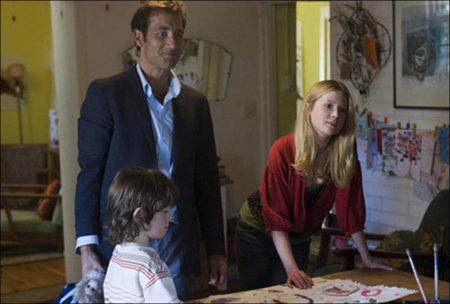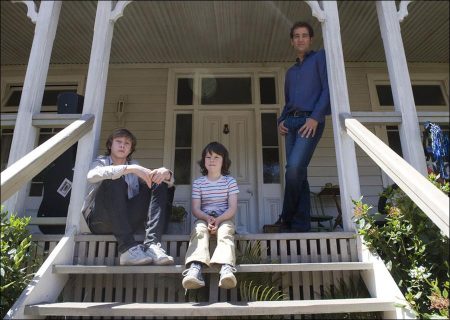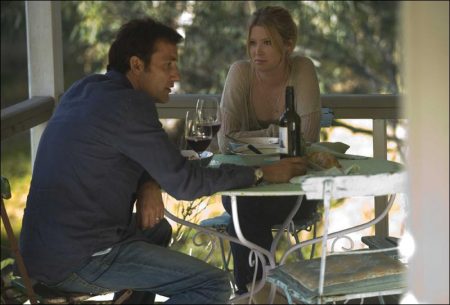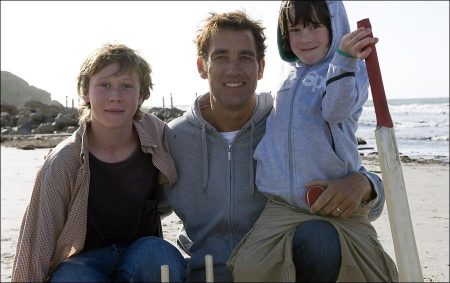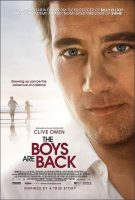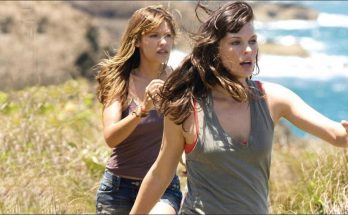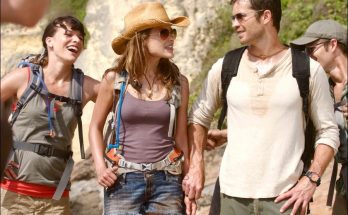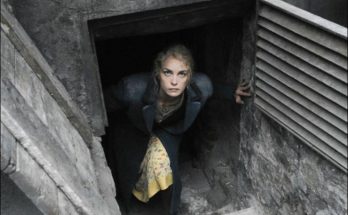Tagline: Growing up can be the adventure of a lifetime.
The Boys Are Back movie storyline. A witty, wisecracking, action-oriented sportswriter (Clive Owen) who, in the wake of his wife’s tragic death, finds himself in a sudden, stultifying state of single parenthood. With turbulent emotions swirling just below the surface, Joe Warr throws himself into the only child-rearing philosophy he thinks has a shot at bringing joy back into their lives: “just say yes.”
Raising two boys – a curious six year-old (Nicholas McAnulty) and a rebel teen from a previous marriage — in a household devoid of feminine influence, and with an unabashed lack of rules, life becomes exuberant, instinctual, reckless… and on the constant verge of disaster. United by unspoken love, conflicted by fierce feelings and in search of a road forward, the three multi-generational boys of the Warr household, father and sons alike, must each find their own way, however tenuous, to grow up. Their story is not just about the transforming power of a family crisis — but the unavoidable grace of everyday life and love that gets them through.
The rocky, precarious, yet insistently life-affirming journey of THE BOYS ARE BACK began with the real-life story of a father facing his family’s greatest crisis the only way he could – by sheer instinct, with unflagging humor and a dogged refusal to give up on the most primal basics of love and life no matter the daily battles ahead. In 1994, Simon Carr’s wife Susie died after a gutsy bout against cancer. Up till then, life had been pretty darned good for the journalist– he was deeply in love, a respected workaholic and a man with a spontaneous streak of adventure and dry wit. But suddenly, Carr woke up a single father without a single clue as to how to go on, let alone do the laundry.
Wrestling with an oncoming tidal wave of foreign emotions, Carr nevertheless had to figure out how to reinvent himself, how to go from a shell-shocked widower to a hands-on dad with the wherewithal to bring his family back from the brink. It wasn’t easy, and there was no map. He dodged all the do-gooder advice, and started his own experiment in what he called “free range” parenting.
He proudly made every mistake in the book. And yet, somehow, day after day, struggle after struggle, Carr and his two sons found a way to grab onto momentary pleasures – and each other – as they began to reemerge as a stronger, different kind of family unit than they might have imagined. Though they called themselves “The Lost Boys,” father and sons found something vitally sustaining in each other – and in the human spirit’s capability to survive a world where nothing, ever, can be taken for granted.
In 2001, Carr published his memoir, The Boys Are Back to stellar reviews and a passionate readership. The Daily Mail called it “achingly funny and almost unbearably moving” and the Sunday Times said “Carr’s brilliantly written account of life as a single parent should be a required manual on parenting.” For Carr, the book was a chance to not only come to grips with what had happened to him, but to write about family from a perspective that has long been a mysterious blank spot in literature and film: the “dad” POV, and especially how dads interact with their kids. “I wrote the book as an explication of what it was like for a single father to bring up two boys in an all-male household,” he says. “Our role as fathers hasn’t been all that well-explored over the last 25 years and I wanted to make up a bit for that, because we do it completely differently from the way that women do.”
Carr generated controversy by writing candidly about his exuberant “Just Say Yes” policy that resulted in all kinds of unforeseen mischief, including the transformative day his younger son decided to leap off a window sill into their large bath tub. “Of course my first instinct was to say ‘you can’t, do that, you might hurt yourself,’” Carr recalls, “but the truth is I will remember that evening the rest of my life. On my dying day, I will lie in my bed and look into the increasing darkness and remember the exhilarating joy on my son’s face.” It was that exhilarating joy — a welcoming back of life in all its messiness and unpredictability — that Carr hoped to share by telling his story with gritty honesty.
Of course, he could not have foreseen that his intimate confessions of how he simultaneously faced incomprehensible loss and fledgling fatherhood would one day result in a screen character brought to life with raw emotions by one of today’s most sought-after leading men – Academy Award® nominee and Golden Globe® winner Clive Owen — in an exposed dramatic turn. Carr’s name would be shifted to Joe Warr, and details of his family’s story would be changed, but when all was said and done, Carr was stunned to see the movie reflect back to him both some of the most devastating and most wonderful moments of his life.
He admits that this process – of taking his still-raw, emotional experience, turning it into a book and then watching an extraordinary creative team transform it into a stirring screen drama — hasn’t been without difficulty, but he says it’s worth it for a story he still believes is worth sharing. Carr summarizes: “Making the film has been moving and it’s brought back a lot of memories. We were all excited about seeing the actors recreate our lives, but we also had to be brave.”
The Screenplay
Shortly after the publication of The Boys are Back, Simon Carr found himself in a surreal conversation with Peter Bennett-Jones, chairman of Tiger Aspect Pictures, whose films include the critical smash, coming-of-age tale Billy Elliot. Having fallen head over heals for Carr’s memoir, Bennett-Jones told him outright that he thought it would make a terrific film. “My pessimism was utterly confounded by Peter’s determination to get this project out,” admits Carr.
The team at Tiger Aspect was driven to make the film in part because they saw something fresh in Carr’s story that hadn’t been brought to the screen. Explains Tiger Aspect Pictures’ co-chair man and producer Greg Brenman, “We felt the story had real appeal because it uniquely captures the wildness of spirit and the sort of semi-feral way that men bring up kids,” he says. “At the same time, it’s about the memorable experiences that we all have in childhood.”
And at the heart of it all was the character of Carr himself. “He’s such a larger than life, outrageous, intentionally contentious and provocative, charming, seductive guy that we felt that his spirit and essence would make for an unforgettable lead character,” says Brenman.
Undeterred by Carr’s momentary skepticism, Tiger Aspect undertook a search for a screenwriter who could match Carr’s seriocomic sensibilities and found exactly that in Allan Cubitt. Although best known for his work on the multi award-winning British mystery series Prime Suspect 2, Cubitt’s work is diverse, ranging from adaptations of Anna Karenina and The Hound of the Baskervilles to the BBC mini-series, The Hanging Gale, about a family in the midst of the Irish Potato famine. It was his passion for Carr’s book that made him the winning candidate.
“I loved the book,” Cubitt says. “There were so many things that struck me as true and interesting and funny. The challenge of it, though, was that it’s a very much structured as a memoir, as a series of reflections on life and death and parenting and everything else that comes into Simon’s orbit. We had to take that essence and find a way to make it work in a film narrative.”
During early drafts, Cubitt began to mold the character of Joe Warr, relocating the story from New Zealand (where Carr moved as a British expat) to Australia and changing his occupation from political journalism to a more action-oriented sportswriter. As he wrote about him, Cubitt began to form a great deal of love and compassion for the emerging character. “I felt great sympathy and empathy with Joe, and I hope he has achieved an independent life of his own,” says Cubitt. “His joy and pain were both so real to me that I was frequently in tears while writing.”
To garner further insight, Cubitt met with UK sports journalist Richard Williams to learn more about a sportswriter’s lifestyle. “Sports is a really exciting thing to write about and I wanted Joe to write the sort of colorful, personal column that people enjoy reading so much. I had in mind someone like Martin Amis writing about tennis,” says the screenwriter. “And when Richard said that he was often away for 265 days of the year, that seemed to me to fit well with who Joe is when his wife dies.”
But the heart of the story for Cubitt lay in excavating all the nooks and crannies of father-son relationships at their most vulnerable and vital. “One of the big questions in the book is how do you bring up boys? How do you see them through trauma? And how does a man find a way to relate to his sons? I wanted to expose on screen those things that men don’t necessarily do when women are around, to explore the intimacy of their relationships, which are physical and sporty but I think also very touching and true,” sums up Cubitt.
The Boys Are Back (2009)
Directed by: Scott Hicks
Starring: Clive Owen, Laura Fraser, Emma Booth, George MacKay, Nicholas McAnulty, Natasha Little, Alexandra Schepisi, Emma Lung, Steven Robertson, Georgina Naidu, Daniel Carter, Chris Haywood
Screenplay by: Allan Cubitt
Production Design by: Melinda Doring
Cinematography by: Greig Fraser
Film Editing by: Scott Gray
Costume Design by: Emily Seresin
Set Decoration by: Nic Datson,Glen W. Johnson
Art Direction by: Janie Parker
Music by: Hal Lindes
MPAA Rating: PG-13 for sexual language and thematic elements.
Distributed by: Miramax Films
Release Date: September 25, 2009
Views: 77
